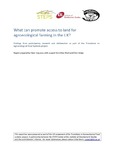| dc.contributor.author | Ferguson, Clare | |
| dc.contributor.author | Wach, Elise | |
| dc.contributor.author | Smaje, Chris | |
| dc.date.accessioned | 2017-10-20T13:16:27Z | |
| dc.date.available | 2017-10-20T13:16:27Z | |
| dc.date.issued | 2017 | |
| dc.identifier.citation | Ferguson, C.; Wach, E. and Smaje, C. (2017) What can promote access to land for agroecological farming in the UK? Findings from participatory research and deliberation as part of the Transitions to Agroecological Food Systems project, Brighton: IDS | en |
| dc.identifier.uri | https://opendocs.ids.ac.uk/opendocs/handle/20.500.12413/13298 | |
| dc.description | This report has been prepared as part of the UK component of the Transitions to Agroecological Food systems project, in partnership between the STEPS Centre at the Institute of Development Studies and the Land Workers’ Alliance. For more information, please contact Elise Wach, e.wach@ids.ac.uk | en |
| dc.description.abstract | Land emerged strongly, from the panel discussions, as a major issue for new entrants to agroecological farming. Access to land has long been a key barrier to new entrants to farming and has become more difficult in the last decade or so. A member of the farmers’ panel commented that, back when she set up her business, it was possible to take out a loan to buy the land and pay that back with the profits from farming, but that route is now completely out of reach for the majority of farmers, especially small- and medium-scale farmers.
Land ownership, in the UK, has been heavily skewed towards the very richest for hundreds of years. In 2011, Kevin Cahill, found that over two-thirds of the land was owned by 0.36% of the population, or 189,000 families. High land prices, due to speculation, combine with planning obstacles and typically short tenure agreements to block access to land for would-be farmers. The existing system incentivises land consolidation which further compromises the ability of new entrants to acquire land and presents challenges for small-scale farmers to maintain viability.
In addition, to obtaining the land itself, finding somewhere to live is also a major difficulty for many would-be producers. Acquiring planning permits, for both agriculture and housing, is difficult due to regulations that were originally intended to ensure the availability of agricultural land. Meanwhile, new farm businesses often do not generate enough income to support a mortgage on a home nearby. Beyond the costs, the inability to live onsite is also problematic for engaging in agroecological approaches (e.g., in small-scale dairies and horticulture production), as they often require regular contact with the land.
In order to address these land access challenges, the panel discussed the potentials of both (a) working within the existing system (i.e. navigating existing policies, regulations and institutions), and (b) working to change the system (i.e. revising or introducing new policies, regulations and institutions). Approaches for working within the system, for example, included trying to match landowners who have unused land with new landless entrants looking to get into farming. This is an initiative, which the LWA has been planning to start and which is also carried out by organisations such as the Fresh Start Land Enterprise Centre. The Ecological Land Co-op is also working from this angle by acquiring larger pieces of land and making them accessible to tenant small-scale ecological producers by gaining the necessary planning permissions and installing utilities and road access. In terms of change at a higher level, some approaches include revising tax and other policies to facilitate more widespread change in access to land, for new entrants and ecological farmers (who often operate at smaller scales). This report explores both of these approaches in further detail based on a review of documents and a series of interviews. It then provides details of the presentations given by two key witnesses and a summary of the outcomes of the farmer panel deliberation. | en |
| dc.description.sponsorship | Daniel & Nina Carasso Foundation | en |
| dc.description.sponsorship | New Field Foundation | en |
| dc.language.iso | en | en |
| dc.publisher | IDS | en |
| dc.rights.uri | http://creativecommons.org/licenses/by/4.0/ | en |
| dc.subject | Agriculture | en |
| dc.subject | Nutrition | en |
| dc.subject | Participation | en |
| dc.subject | Rural Development | en |
| dc.title | What can promote access to land for agroecological farming in the UK? Findings from participatory research and deliberation as part of the Transitions to Agroecological Food Systems project | en |
| dc.type | IDS Working Paper | en |
| dc.rights.holder | STEPS/IDS/Land Workers’ Alliance | en |
| dc.identifier.team | Business, Markets and the State | en |
| rioxxterms.funder | Default funder | en |
| rioxxterms.identifier.project | Transitions to Agroecological Food Systems | en |
| rioxxterms.version | VoR | en |
| rioxxterms.funder.project | 74bcae92-2a96-4547-9ef2-99c11f271bc2 | en |


